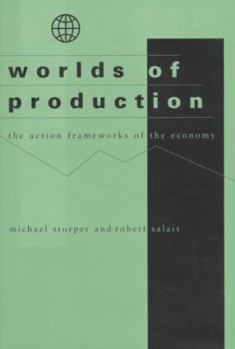Worlds of Production: The Action Frameworks of the Economy
Select Format
Select Condition 
Book Overview
This intellectually bold but accessible book seeks to go beyond limitations of the reigning neoclassical and institutional paradigms in explaining the organization of economic activity. It does this by construing "non-economic" factors such as institutions, cultures, and social practices as conventions, which coordinate economic actors by defining specific "frameworks of economic action." In these conventional frameworks, the standard distinction...
Format:Hardcover
Language:English
ISBN:0674962036
ISBN13:9780674962033
Release Date:May 1997
Publisher:Harvard University Press
Length:370 Pages
Weight:1.55 lbs.
Dimensions:1.1" x 6.4" x 9.5"
Customer Reviews
0 rating





